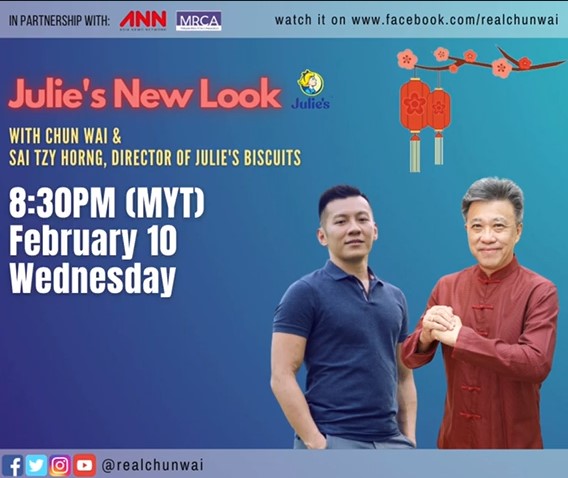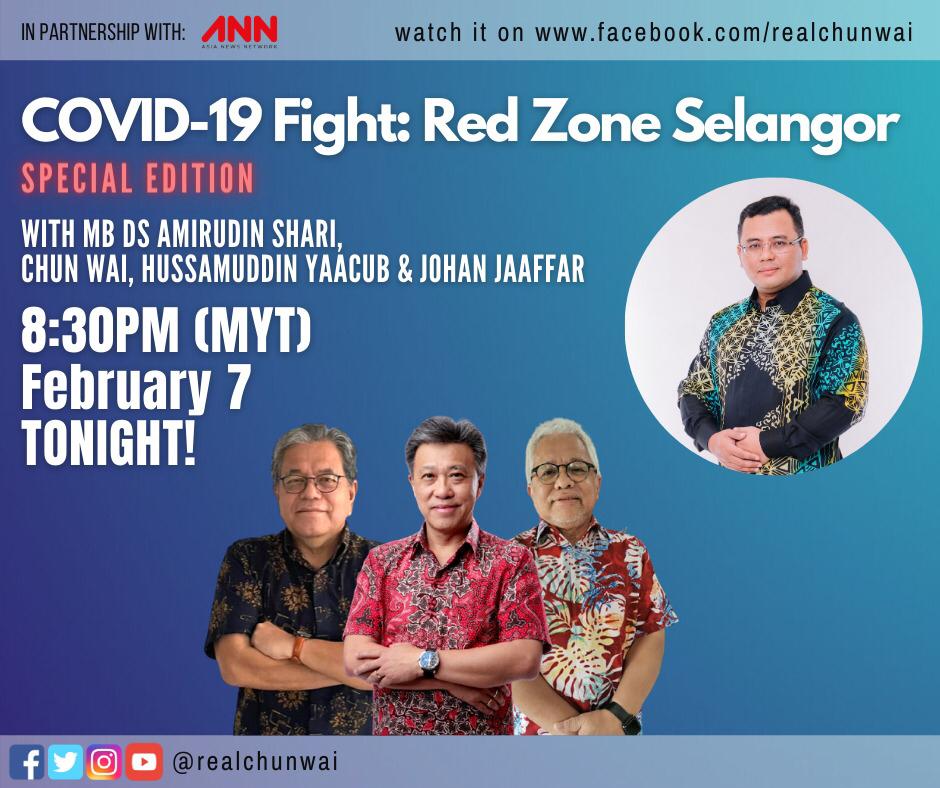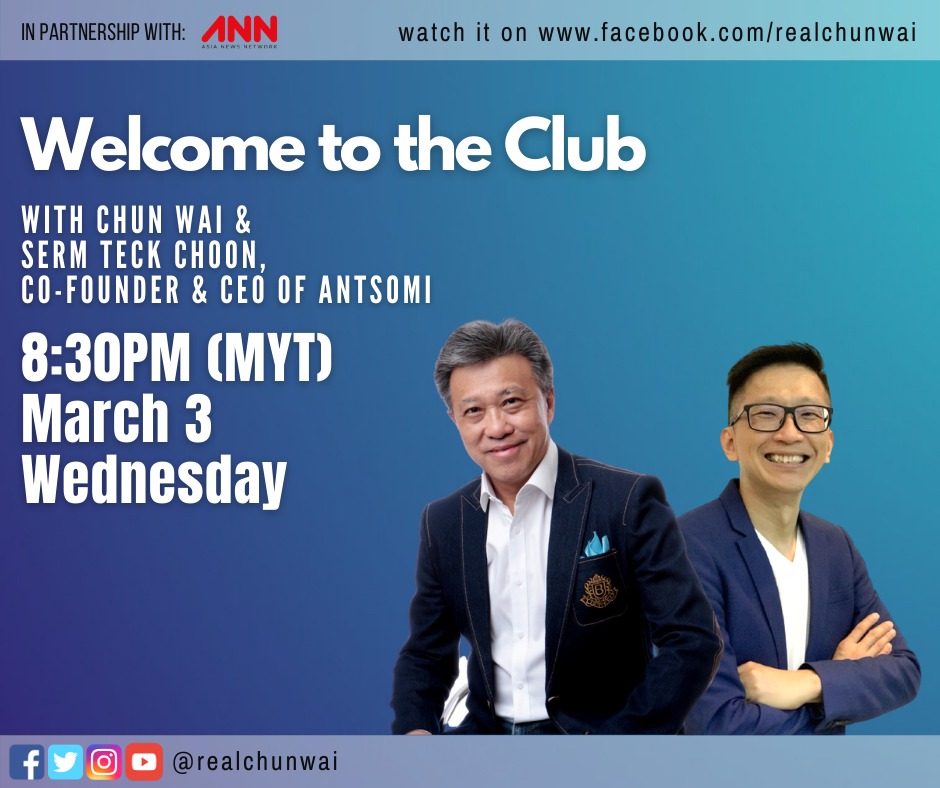

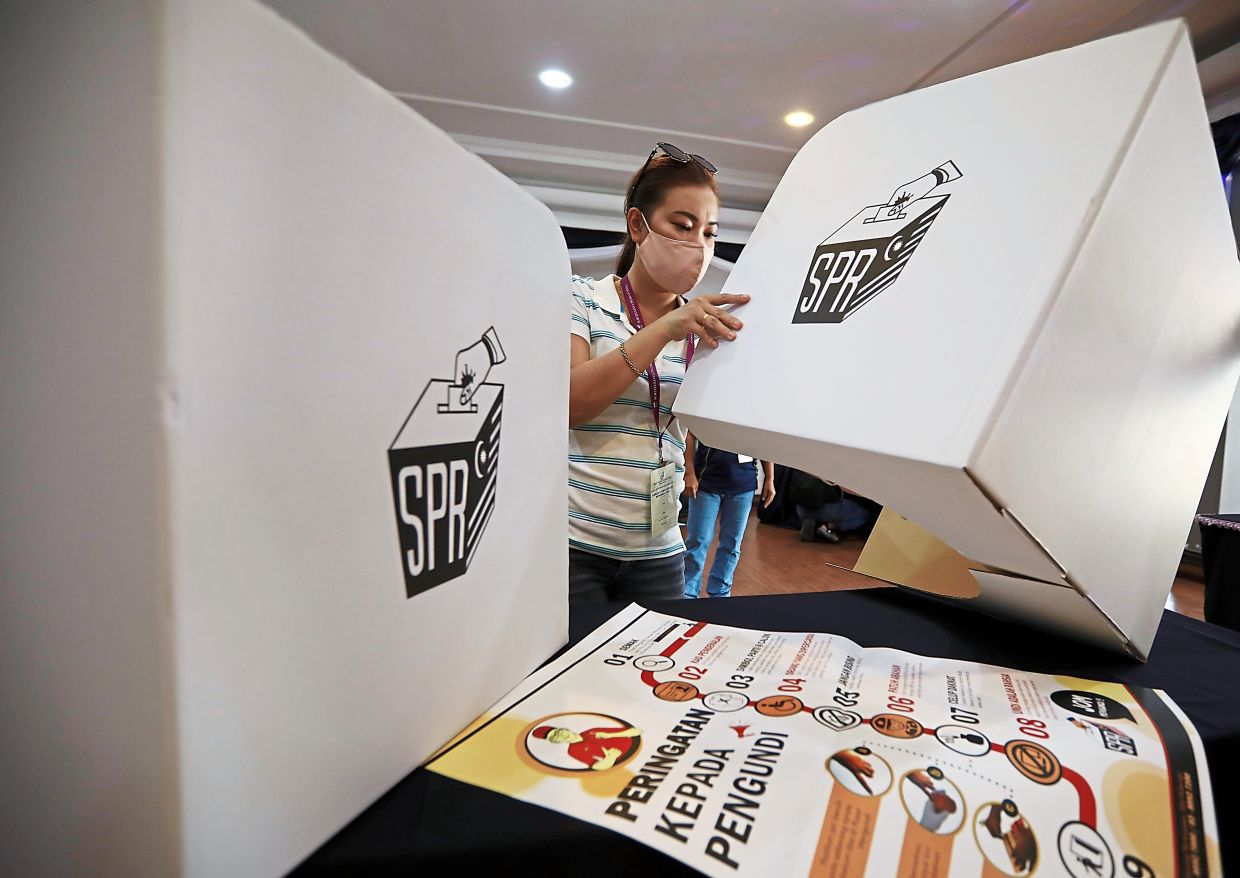
Always ready: Election Commission staff Nelly Golor making the final preparations during the Sabah polls in September last year. Now, many are betting that the general elections will be held by August this year.
PREPARATIONS for the next general election have sparked into life, even though the national Emergency only ends in August. But that’s just about five months away.
Negotiations between Umno, Parti Pribumi Bersatu Malaysia and PAS, the three main political parties in the federal government, have entered a crucial phase. As with any deliberation, each is pushing hard to get the most seats.
Working out a deal is obviously most frustrating for Umno and Bersatu because of overlapping claims.
Many of the Bersatu Members of Parliament contested on Umno tickets in the previous general election, but Umno is now insisting these seats be contested by its own candidates instead.
From the union of three parties, Umno is also demanding it be given the most seats to contest this time.
Then, there’s the role of PAS. Umno has sent the Islamist party a message – work with Bersatu or us.
Tan Sri Muhyiddin Yassin has also given Umno an ultimatum, insisting the party makes clear its stand on contesting the general election as part of the Perikatan Nasional. And he wants the answer by March 1 – tomorrow.
The sentiment emanating from Umno is that it’s prepared to go to the polls on its own because its grassroots feel that without a well-structured party machinery, Bersatu can’t function.
Umno feels Bersatu needs it and not the other way around.
But Bersatu has the ace – the Prime Ministership. So long as Tan Sri Muhyiddin Yassin retains the post, despite having only a two-seat majority in Parliament, he holds the trump card. He’s Boss in form and function.
PAS, which is labouring to hold the three Malay-based parties together, will find it easier to partner Bersatu if forced to choose, because it’s unlikely Bersatu will squabble over Kedah, Terengganu and Kelantan.
Umno, on the other hand, has long battled with PAS over these three predominantly Malay states.
Given the uncertainties, Umno has openly hinted that it’s prepared to work with its foes to draw a political equation.
It has worked with PAS, its once bitter rival, and now, it’s ready to even cooperate with the DAP.
The Malay-Muslim unity narrative is perhaps much easier to use to convince the Malay grassroots but it will be much harder to justify working with DAP. After all, Umno attacked the DAP when the latter was given key positions under the Pakatan Harapan government. Even Tun Dr Mahathir Mohamad struggled to handle the criticism.
It didn’t help that some DAP ministers lacked tact and finesse to work with key Malay government officials.
Their mannerism and language, and the way they behaved like opposition figures despite being in government, led to a complete breakdown in the relationship. It was unfortunately a wasted opportunity.
But Umno, which played the race card by harping on purported DAP dominance, is now ready to work with it to form the next federal government because it believes DAP can deliver 40-odd seats in the Dewan Rakyat.
Hardcore DAP supporters still find it hard to believe that Umno – which DAP leaders have demonised since its formation – has started dating ahead of the next elections.
In fact, the Perak DAP is trying to wriggle its way into the Umno-led Perak state government, which was formed in December last year after DAP failed to get state executive councillor seats.
Perak DAP chief Nga Kor Ming revealed that there was a series of negotiations with Umno, but in the end, DAP got nothing.
Nga wouldn’t have had discussions without the blessings of the national DAP leadership.
It’s almost certain DAP won’t respond or commit to Umno’s eager overtures now as it would cause premature controversies, which would surely anger the DAP grassroots.
For justification’s sake, DAP, too, has worked with PAS after criticising the Islamist party for decades.
Datuk Seri Najib Razak is also testing the waters by saying such an arrangement would only be struck if the grassroots approved.
But any real pact would only happen after the general election. Based on the present political climate, Malaysians can expect their decisions to be fragmented and messy.
As Umno vice-president Datuk Seri Ismail Sabri Yaakob said last week, the general election is just around the corner.
One senior Minister has put up her election billboard in her constituency. A potential PKR candidate has openly declared he’s in the race, even before his party has officialised his role.
Many potential Barisan Nasional candidates have already started making their presence felt in their respective constituencies.
Every indication now points to a general election by August. By then, the number of Covid-19 cases would have dropped sharply, the mass vaccine programme would be near completion and the economy would be stable, aided also by oil’s price surpassing the US$60 per barrel mark. All this against a backdrop of commodity prices spiralling.
Malaysia gains RM300mil for every US dollar increase in crude oil price, so it will certainly be a boost to the economy.
The court sentences of key political figures facing various graft charges provides a barometer to how serious the PM is in combating corruption. Even if they have avenues of appeal in the higher courts, their political careers have still taken a beating.
The deadline for the Sarawak state elections is August, and the bet now is that it will coincide with the federal election.
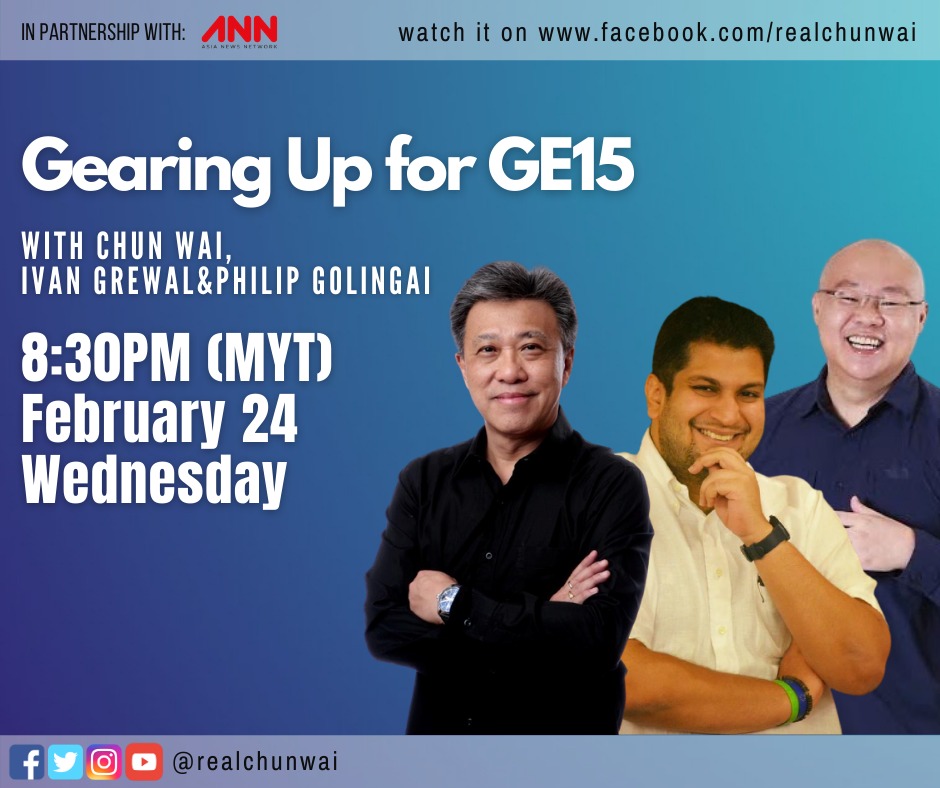
Why illegitimise a legal trade and legitimise an illegal one by doing what’s obviously counter-productive?
EVERYTHING in Malaysia seems to be politicised. Nothing is missed and as the nation heads towards a possible general election by August, the situation has progressively become worse.
PAS is grumbling about the gambling sector reopening, saying it doesn’t benefit the country.
Its Federal Territories committee is upset that the government is allowing casinos and gambling companies to operate again.
Now that’s no longer news to us, really, but PAS has ramped up the campaign.
Likewise, for the federal government, increasing sin taxes on liquor and cigarettes has always been a populist move.
However, life isn’t that straightforward.
In fact, if we talk about the world’s oldest profession, for example, it has existed since time immemorial, in different forms and under different names. Whether it’s a contract marriage or sugar daddy arrangement, it’s basically paid sex. So let’s not kid ourselves.
In PAS’ Utopian world, vices don’t exist, and punishment by lashing is apparently the answer to such evil.
I don’t condone gambling. In fact, I frown upon it, but I’m also a realist. For PAS, it ends there. For me, I have other “vices”. I love my beer and whisky.
Truth be told, illegal betting syndicates steal large chunks of the legitimate Number Forecast Operators’ (NFO) business and rob the government of some RM3bil in tax revenue annually.
According to news reports, the activities of these illegal 4D operations have expanded and become more sophisticated over the last decade, eating up market share by the day.
“These illegal 4D syndicates not only offer bigger cash prizes compared with the legitimate NFOs but also extend credit and allow online buying via WhatsApp on draw days, ” said the source in a report.
PAS has questioned who are the beneficiaries of gambling. The answer: criminal-linked illegal bookies and corrupt police officers, if gambling is banned or even further regulated.
So the more action taken against legal gaming operators who pay taxes, the happier these crooks will be.
The Straits Times reported that revenue from the NFOs was more than RM9bil, with sales tax amounting to about RM2bil annually.
However, a news report quoting a source said the illegal 4D operation was known to be one-and-a-half to two times larger than the legitimate NFOs’ business.
So the government could be losing up to RM3bil a year.
The pay-out for a winning number is 70/30, meaning for every RM1 4D sale, 70 sen would go towards the payment of the winning number while the operator makes 30 sen.
Given its lucrative nature, illegal operators are often connected to the underworld or triads.
“They make much more than the NFOs because they don’t pay tax, ” said the source.
The source revealed that the syndicates also pay good commissions of between 20% and 30% to illegal 4D runners.
“For full-time runners, they can make between RM3,000 and RM10,000 a month, depending on their locality and credit given to punters, ” said the source.
Another news report said authorities need more legal muscle to curb the growing illegal gambling and bookmaking menace in the country.
Lawyer R. Rishi said the Common Gaming Houses Act, which was enacted in 1953, needs to be revised to keep up with the times, particularly with regulating online gambling.
“The government must be serious about looking into this, as current technology allows users to place bets from their cellphones easily, ” Rishi said.
He added that even though there are the Anti-Money Laundering Act 2001 (Amla) and Prevention of Crime Act 1959 (Poca), these laws are not tailored to deal with illegal gambling, especially if it is conducted in cyberspace and beyond national borders.
Welcome to the digital age. One doesn’t even need to go to a casino or empat ekor outlet to place a bet when it’s available at a click – on any gambling link from outside the country.
Resort World Genting pays annual government fees, duties and taxes amounting to over RM2bil, according to analysts’ estimates.
It supports the employment of about 70,000 people, including staff, third party businesses, suppliers and contractors.
It also buys more than RM1.2bil worth of products and services from local suppliers, which benefits more than 40,000 people through its philanthropic efforts.
Then, there’s the issue of smuggled cigarettes.
Up to RM5bil a year in taxes goes up in smoke at the expense of the Malaysian government because of this recurring problem.
JT International Berhad said in one report there were more illegal cigarettes purchased by Malaysians than legal ones in 2018, and that this scenario is an upward trend.
The “2018 Illicit Cigarette Study”, conducted by research house Nielsen and commissioned by the Confederation of Malaysian Tobacco Manufacturers, showed that 58.9% of all cigarettes sold – about 12 billion sticks – were contraband.
So like it or not, Malaysia is a haven for smuggled cigarettes.
And the losses don’t end there either. According to the Malaysian brewing industry’s estimates, contraband beer makes up 70% of the total beer volume sold in Sabah and Sarawak.
For Peninsular Malaysia, contraband beer represents 14% of the total beer volume sold.
This means the Malaysian government loses more than RM1.1bil in annual revenue to the illegal alcohol trade, a figure which is part of the RM300bil shadow economy of the country, according to The Edge.
In 2019, the brewery industry contributed some RM2.27bil in tax revenue to the public coffers. But there’s an estimated tax revenue loss of RM1bil a year caused by illicit alcohol, according to the Confederation of Malaysian Brewers Bhd.
The problem is that issues like gambling and liquor are always fraught with difficulties, in terms of busting them.
We must deal with our unique dual system of law and contrasting stands of Malaysians.
These industries are already highly regulated so there’s no question of making it more difficult for them.
If smuggling is a problem, making it tougher for traditional (and legal) gambling companies will not help when one can just place a bet online, which comes in various guises.
So does PAS want to bet that it can eradicate illegal gambling and smuggled cigarettes and liquor, and that we don’t truly need billions of ringgit in taxes?
Ultimately, the smugglers and crooked cops will be laughing all the way to the bank should these legal gaming and drinking outlets be terminated.
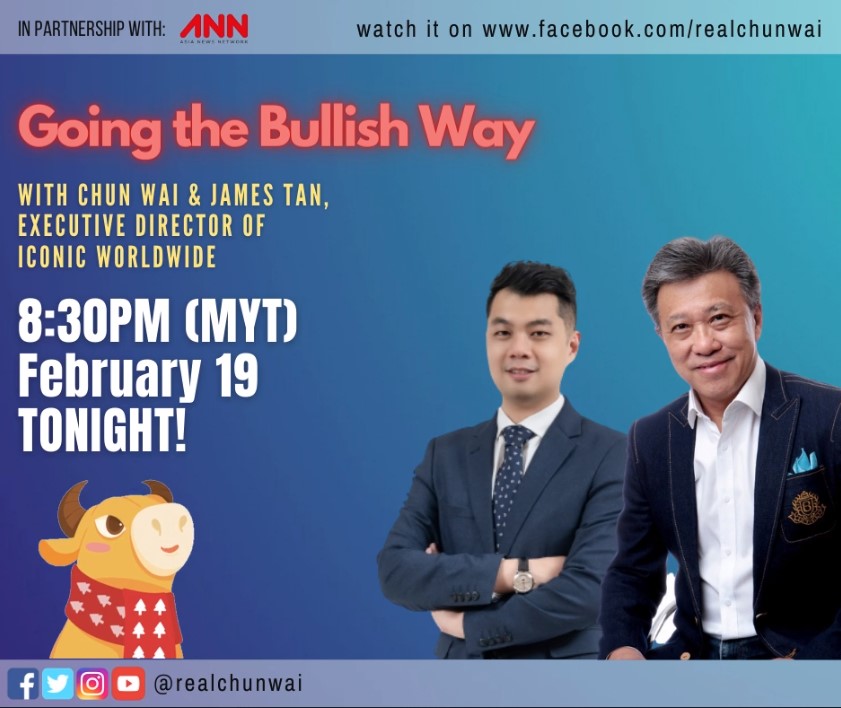

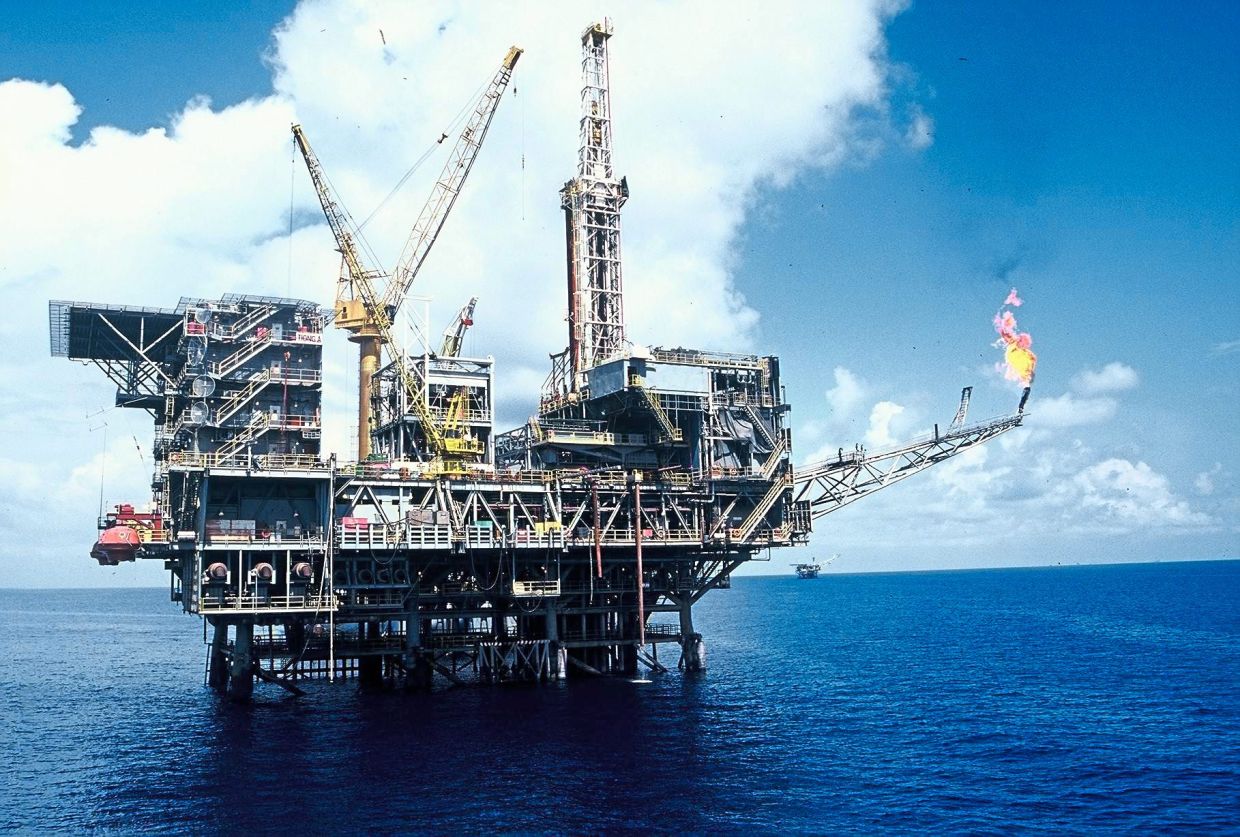
Surging forward: If oil continues to stay at US$60 per barrel, it will bring Malaysia additional revenue of RM5.4bil that will shore up our balance sheet. — Filepic/Petronas
IT’S the Chinese New Year, so it’s important we kick off the Year of the Ox with bullish optimism. There are just too many naysayers among us who love to depict the worst of Malaysia and parade those sentiments on social media.
Nothing seems to be right and we let politics get in our way. The habit of forwarding every single political message is simply self-sabotage.
But I think we can take this happy and auspicious occasion to share some positive vibes.
While the world continues to struggle with the Covid-19 pandemic that has also robbed us of the opportunity to visit our families and friends for CNY, I embrace the good news of mass vaccination being planned in most parts of the globe.
In Malaysia, almost the entire population should be covered by the end of next year.
With the inoculation exercise’s imminent roll out, we should be able to stem the tide of contagion and have this virus firmly under control. After all, it’s wrecked our lives and livelihoods for long enough.
Last week, for the first time in a long time, oil prices soared for a ninth day on Wednesday. This has been its greatest success in two years, aided by producer supply cuts and the belief that the availability of vaccines will spur the desperate need for economic recovery.
Brent crude was up 44 cents, or 0.7%, at US$61.53 (RM248.74) last week after an encouraging 13- month run of US$61.61 (RM249.06) earlier in the session. US crude was up 37 cents, or 0.6%, to US$58.73 (RM237.42), having touched US$58.76 (RM237.54), registering a high of the same duration.
It’s been nine sessions in a row for Brent’s rise, its longest run of gains since December 2018 to January 2019. The consensus among analysts is prices have surged beyond the underlying fundamentals, a report revealed.
If oil continues to stay at US$60 (RM242.55) per barrel, it will bring Malaysia additional oil-related revenue of RM5.4bil.
According to a report, higher oil prices would relieve the budget – given its tight fiscal space – and help shore up the government’s balance sheet.
In fact, on the first day of CNY in New York, the price of Brent crude climbed to US$62.43 (RM252.37) a barrel. Even though the price of oil has always been volatile, this good showing will help our coffers.
Meanwhile, as the price of crude oil continues to climb, the ringgit has also strengthened against the US dollar.
Optimism has surfaced because the market expects production to begin with oil prices moving up since November and governments starting their vaccination drives while installing large stimulus packages to boost economic activity. Of course, the world’s top producers kept a lid on supply, too.
Former Treasury secretary-general Tan Sri Mohd Sheriff Mohd Kassim noted that commodity prices in general were rising with the hope of world recovery this year.
He added that our manufacturers were feeling confident the global demand for Malaysian-made products would also start picking up soon.
“So we can expect 2021 to be the beginning of economic recovery, ” he predicts.
This month and the next, prime exporter Saudi Arabia will be reducing supply, augmenting cuts agreed by other Opec+ (Organisation of the Petroleum Exporting Countries) members and allies.
Supply will fall short of demand this year – that’s the belief of some analysts, especially as the world’s population progressively gets vaccinated and demand for travel and office work resumes.
The aviation industry, which has withered following the closure of international borders, will recover because of the overwhelming demand for air travel.
More importantly, Malaysia will gain RM300mil for every US dollar increase in crude oil prices at current levels of the US dollar-ringgit exchange rate.
On our end, the National Immunisation Programme, targeting 80% of Malaysians, will be a key factor in driving our growth in 2021, which is something most of us are looking forward to.
Then there’s the 12th Malaysia Plan and Budget 2022, in which the government will also look into various structural and inter-ministry solutions. They include revamping our human capital policies; building capacity for the transition to a higher-income nation; reassessing the economy from an ESG (environmental, social and governance) standpoint to achieve our Shared Prosperity Vision; strengthening our revenue base; and creating a sustainable ecosystem for entrepreneurship and innovation.
Malaysia clearly must reform its national investment strategy since we can’t rely on cheap foreign labour because it will only have a temporary effect.
Sooner or later, investors will find it easier and cheaper to move to the likes of Indonesia, Vietnam and Cambodia for the abundant labour force and lower wages.
We need to attract high-quality investments that can meaningfully enhance our productive capacity, create high-skilled jobs, promote technology transfer, and foster domestic linkages.
There has been much talk of Malaysia losing out in foreign direct investments (FDI), but during the first nine months of 2020, investments approved totalled RM10bil, of which 40% was FDI, including high-end and high-technology multinational corporations that have set up shop here or increased their investments.
According to Finance Minister Senator Tengku Datuk Seri Zafrul Aziz, the Malaysian Industrial Development Authority has also identified 240 high profile FDIs with a combined potential investment of close to RM82bil.
But we need to work harder on our narratives with the media – local and foreign – as well as investors. And in asking Malaysians to play their part, we expect our politicians to be better role models, too.
Bad news seems to fly fast, and good news rarely takes off. Excessive politicking and unproductive rhetoric on race and religion needs to be eradicated because Malaysia has a good thing going. And it can only get better if we make the right choices.
To all Malaysians, let’s hope the bull comes charging at us with great news! Gong Xi Fa Cai to all who celebrate the Chinese New Year.
